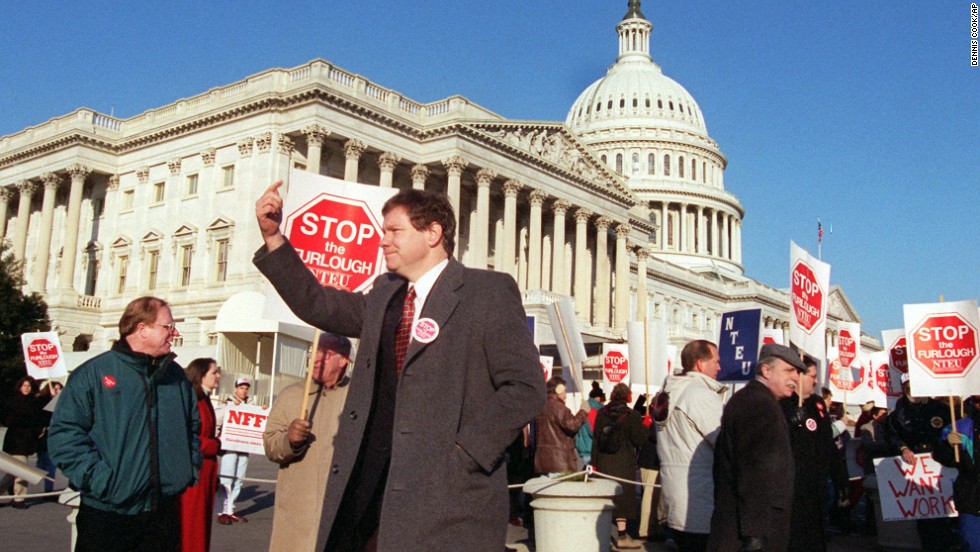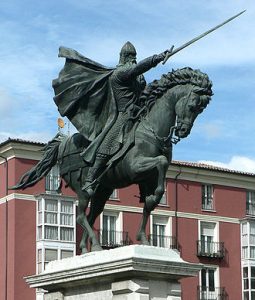The night of November 14, 1995 was supposed to be a victory for the Republican-controlled Congress. After passing a budget that would fund the government and decrease government spending, the Republicans felt confident that they averted a shutdown. However, that was not the case. By the time the budget made its way to the desk of Democratic president Bill Clinton, Clinton refused to sign the bill to fund the government. By refusing to sign the budget, parts of the government shut down. This led to protests by government employees, since they were not given their paychecks from the government.

Clinton wanted to increase funds for Medicare, Medicaid, education, and preserving the environment.1 The Republicans, though, wanted the opposite. By refusing to increase funding for Medicare, Medicaid, and preserving the environment, Clinton vetoed the budget and held negotiations to reach a compromise. However, Clinton had an issue with one of the Republican leaders he was meeting with, House Speaker Newt Gingrich. Before the shutdown, Clinton and Gingrich attended the funeral of Yitzhak Rabin, the Prime Minister of Israel. During the flight, Gingrich was told to sit at the back of the plane. It was perceived by others that Gingrich tried to use the shutdown as a form of vengeance against President Clinton. Although Gingrich felt angry at Clinton for the event on the flight, it did not affect the ongoing negotiations. After holding talks with Congress for five days, Congress passed a continuing resolution, which kept the government funded until December. Clinton signed the resolution on November 19, 1995, ending the five-day shutdown. After the resolution was signed, Congress was in a race against time to prevent another shutdown. Gingrich, however, thought to use this time to bash the President. During this period, Speaker of the House Newt Gingrich voiced his disagreements with President Clinton on the budget. By doing this, Gingrich made a tactical mistake by appearing too eager to shut down the government again.2 On December 16, 1995, Congress wanted to pass a second continuing resolution to give themselves more time to put the budget together. Clinton soon vetoed the resolution, thus sending the government into another shutdown. Both Congress and President Clinton found themselves back at the drawing board again.

President Clinton and Congress met on December 29, 1995, to compromise on a budget. During this time, the country was getting ready for the presidential elections. Republicans sought to use this shutdown as a weapon against Clinton’s failed policies. The negotiations continued until January 1996. On January 5, 1996, protests had erupted outside the Capitol. Government workers were demanding the end of the government shutdown, so they could get paid. Republicans held a press conference about the negotiations. They argued that they were trying to reduce government spending on federal programs, whereas Clinton wanted to increase spending for those programs. In some sense, Republicans thought that the amount of federal spending was one of the bones they had to pick with Clinton.3 By January 6, 1996, a compromise was met and President Clinton agreed to sign the budget bill, thus ending the twenty-one-day shutdown.

Although the shutdown was over, there were some benefits for both political parties. The Democrats and the Republicans made some gains after the 1996 presidential election. Democrats gained a few seats in the House of Representatives. Republicans, on the other hand, gained two seats in the Senate and kept control of Congress. House Speaker Newt Gingrich, however, had his political reputation damaged because of the disagreements with President Clinton over the budget. President Clinton’s job approval ratings were generally above the 50% mark after the shutdown in 1996 and he cruised to a re-election victory over his Republican opponent, Senator Bob Dole, in the fall of that year.4
- David J. Maraniss, The First Term. In Presidents: A Reference History (Detroit: Charles Scribner’s Sons, 2002), 626. ↵
- Kessler Glenn, “The Fact Checker: Lessons from the government shutdown of 1995-96,” The Washington Post no.1 (February 2011): 1. ↵
- George F. Will, “Republicans as Red Sox: The 1995 government shutdown reduced the importance of GOP control of Congress,” Newsweek no. 1 (October 1998): 92. ↵
- Frank Newport, “More in U.S. Say Shutdown Is About Politics Than Principle,” Gallup Poll Briefing no. 1 (2013): 1. ↵



58 comments
Kimberly Simmons
This article gives great background on the government shutdown by layering all of the events leading up to it. The emphasis on the corruption of politicians allows for a better understanding of why things unfolded in the way that they did. It is unfortunate that the lack of unification among political leaders lead to events like this – hopefully this issue can be reflected on so that it doesn’t happen in the future.
Maria Mancha
From this year alone having two government shut downs. Therefore I think this is a great article to have and to read about. I honestly didnt know there was a government shut down with President Clinton, especially 21 day shutdown which is a very long time. I do wish there was a little more details in the article. Especially over the political parties because there views were very different and it did lead to this larger conflict. However over all I think it was a very good article and I learned something I hadn’t known before.
Rafael Lopez-Rodriguez
This is what happens when you have a government that believe and have a totally different opinion on how situations should be handled. Honestly I was one of those that thought shutdowns did not happen that often. But found interesting how this shutdown interfered with the upcoming elections of that year and one party wanted to get advantage of the situation to maybe get a victory. Interesting article!
Jason Garcia
I thought that government shutdowns were a very recent thing, but reading this and learning the politics behind it I am seeing similarities in the most recent shutdowns. To see that this started by Clinton and Gingrich having conflicts with each other really puts things into perspective. All people have issues to deal with even the President and the house speaker. Politics is not an interesting subject for me but reading this has made me want to look deeper into the things are leaders do.
Ximena Mondragon
This is article is very interesting because government shut downs are still something happening. It is important to know about government shut downs but this is article could of done a better job at pointing out why this government shut down was important. Additionally, I wish this article had more details about the government shut down.
Samuel Stallcup
Government shutdown is a rare occasion, and when it does happen, it is quite the scare. Government employees are there to help the people, and when it is shutdown, nothing is passed or proposed, therefore allotting less time for anything to happen. It is a shame when this happens because it does not benefit anyone. I thought the topic of this article was great, and the execution was great, too.
Matthew Wyatt
Although this article lays out all the relevant facts in an informative way, it could benefit from some style editing. First, try to avoid needless repetition. For example, in the second paragraph you use the phrase “increase funding for Medicare, Medicaid, and preserving the environment” repeatedly. Each time you repeat a phrase, it loses impact. Try to find different ways of saying the same thing. Next, be sure to provide evidence for any assertions that could be considered opinionated. For example, in the last paragraph when you assert that Newt Gingrich’s reputation was damaged by this event you should explain how you came to that conclusion. Did he lose an election? Did his opinion poll numbers drop? These details will make your case stronger. With these simple edits, the piece will become a strong article about a not-so-distant event in history that has sadly already been forgotten.
Hanadi Sonouper
This was a very interesting and well written article, before reading this story I was actually not aware that the government had previous shut downs. It definitely draws attention to the matters in our country’s government that are not fully sorted or agreed upon by both republicans and democrats. However, I will say that President Clinton did have his positive impacts while president, he was a voice for the people and was able to accomplish many great things during his time. This story also ties into this years previous government shut down, it is a bit unsettling for the employers in the situations, however if having a shutdown for reaches for an agreement on spending than it is for the right cause.
Iris Henderson
I believe that this article gave great insight as to why the government shutdown happened then and why it still happens now. The lack of unity when it comes to politicians deciding on what can help our country may be difficult and this may very well be the result. However, I do hope that in the future, instead of repeating these mistakes, we can learn to come together and find resolution for our people and our government agencies.
Natalia Carroll-Long
As I’m not as well knowledged when I comes to politics, I’m thankful that your article is easy to understand. Currently, I believe the government has shut down a couple of times in a short period and by reading your article, I’ve come to the comclusion that even if it is for a couple of days, it’s bad and means to government is in complete disarray. Therefore, doesn’t that mean our government is failing right now?